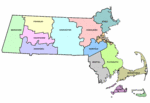 Massachusetts Lawyers Weekly reports in its June 14, 2010 issue that personal injury plaintiffs lost in the vast majority of cases tried in Massachusetts courts in 2009. Under Mass Lawyers Weekly’s rather generous methodology, a “win” for a plaintiff was defined as a case in which the plaintiff received any money at all, even if it was only one dollar, and that dollar was less than what the defendants had previously offered to settle the case. Lawyers Weekly defined a “loss” as a case in which the jury awarded zilch to the plaintiff.
Massachusetts Lawyers Weekly reports in its June 14, 2010 issue that personal injury plaintiffs lost in the vast majority of cases tried in Massachusetts courts in 2009. Under Mass Lawyers Weekly’s rather generous methodology, a “win” for a plaintiff was defined as a case in which the plaintiff received any money at all, even if it was only one dollar, and that dollar was less than what the defendants had previously offered to settle the case. Lawyers Weekly defined a “loss” as a case in which the jury awarded zilch to the plaintiff.
Using these definitions of a “win” and a “loss,” Massachusetts Lawyers Weekly broke the data down by county and found the following percentages of plaintiff’s wins in Massachusetts state courts in 2009:
- Suffolk County (Boston, Chelsea, Revere and Winthrop) – Plaintiffs won in twenty-five percent of the trials.
- Norfolk County – Plaintiffs won in fourteen percent of personal injury trials.
- Middlesex County – Plaintiffs won only twenty-seven percent of personal injury trials.
- Bristol County – Personal injury plaintiffs won only thirty-two percent of trials.
- Worcester County – Plaintiffs won twenty-three percent of trials.
- Essex County – Plaintiffs won thirty-six percent of jury verdicts.
- Cape Cod and Islands – Plaintiffs won eleven percent of jury trials.
- Hampden, Berkshire, Franklin, and Hampshire counties – the percentages of jury verdicts for plaintiffs in these counties ranged from twenty-nine to thirty-three percent.
The data are even worse for Massachusetts personal injury plaintiffs if you revise the definitions of a “win” and a “loss” to fit what most lawyers mean by those terms. Superior Court Judge Brady has kept a personal log of all the negligence trials he’s presided over since being appointed to the bench in 1993. Judge Brady scores a case a “win” for the plaintiff only if the amount the jury awards the plaintiff is greater than the last settlement offer made by the defense. In the 151 negligence trials that Judge Brady has heard in his nearly twenty years on the bench, only 16 have resulted in wins for the plaintiff.
The odds of prevailing at trial may seem pretty dismal for Massachusetts personal injury plaintiffs but there are a few things that should be said about this data. First, there’s an obvious selection bias at work in this study. About ninety-eight percent of cases are resolved by either pre-trial settlement or some form of pre-trial motion to dismiss.
The game theorists tell us that the two percent of cases that make it to trial are cases where at least one party is overestimating the strength of its hand. If you assume a rational defendant in a case, once the defendant is convinced of his legal liability and the dollar value of damages that a jury would force him to pay, the defendant will settle the case, simply to avoid the time and expense he would have to pay to defend the case through trial. The cases that don’t settle tend to be troubled cases where there is vast disagreement about either the defendant’s legal liability or the amount of damages. So the vast majority of personal injury plaintiffs in Massachusetts fare better than the trial data would suggest because the trial data represent the outlier cases that make it to trial.
Nevertheless, I don’t think Massachusetts personal injury lawyers should be happy with those numbers. I think they reflect a certain level of complacency by some Massachusetts personal injury lawyers about how cases should be investigated and tried to a jury. I’ve previously blogged about how Massachusetts’ largest medical malpractice verdict of 2009 – a $15 million case – was turned down by a number of Massachusetts medical malpractice law firms before being taken by a California attorney who was much more aggressive than most Massachusetts medical malpractice attorneys in terms of the number of depositions that he took and the theories that he pursued.
I sensed a lot of defeatism in the Massachusetts Lawyers Weekly article about trying cases in certain counties, especially Norfolk County. I’ve lived the better part of my life in Norfolk County and I have no compunction about trying a case to a Norfolk County jury. You simply need to know who your jurors are and frame the issue properly for them.
If you are injured and require the services of a Boston personal injury attorney, call The Law Office of Alan H. Crede at (617)973-6434 for a free consultation.
